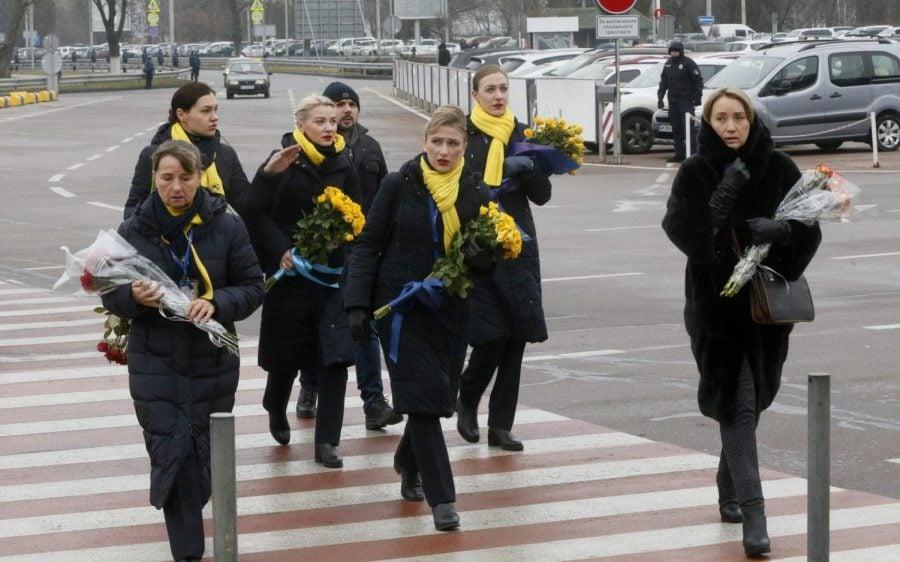176 passengers died earlier this month when a Ukrainian airliner crashed shortly after taking off from Tehran. The Iranian government acknowledged their military had shot down the jet in a reactive response to the U.S. targeted killing of Maj. Gen. Qassem Soleimani, and subsequently amplified tensions between the two countries.
Of the passengers, 82 were Iranian, 63 Canadian, 10 Swedishs, 11 Ukrainian, four Afghani, three German and three British nationals.
Iranian President Hassan Rouhani said in a series of tweets it was a mistake resulting from human error.
“Armed Forces’ internal investigation has concluded that regrettably missiles fired due to human error caused the horrific crash of the Ukrainian plane and death of 176 innocent people,” Rouhani said. “Investigations continue to identify & prosecute this great tragedy & unforgivable mistake.”
DePaul professor Kaveh Ehsani is from Iran and has expertise in Middle Eastern geopolitics. He said the Iranian people had indignation over the revelation that their leadership had carried out this attack.
“There was a huge sense of outrage at the incompetence, at the lying, at the killing of civilians,” Ehsani said.“The government, the ministries the aviation, they had no idea what was going on.”
The flagrant miscommunication stems from the fact that Iran has a democratically elected President, but the military is controlled by the Supreme Leader and answers to his commands.
“It’s a confirmation that the government has no power,” Ehsani said. “That it’s been lied to and it lied to the public. And there’s anger at the military because they have been non-responsive and unaccountable for anything.”
Relations between the U.S. and Iran have been deteriorating since President Donald Trump withdrew from the Iran Nuclear Deal in 2018. Ehsani said the sanctions imposed by the U.S. on Iran have been debilitating for its people and that there is genuine anger towards the U.S. for this and the assassination of Soleimani.
The relationship between Iran and the U.S. is not the only increasingly tense situation as a result of the Trump administration. Relations between the U.S. and Ukraine culminated in the withholding of military aid that is now at the center of Trump’s impeachment trial. The immediacy of this situation has made Ukraine very cautious in the aftermath of the downing of their aircraft.
“Trump has muddied the waters to the point where they don’t know what to say,” said DePaul professor Richard Farkas. “The government has been responding very carefully not to say anything because they just don’t know how it will get interpreted.”
Farkas said Ukraine is also unsure of U.S. policy towards Russia. Ukraine relies heavily on Russian oil and gas. In 2014, Russia annexed the Crimean Peninsula. If Russia were to increase its insurgency in Ukraine by cutting off their energy supply, Ukraine would need to turn to Iran as a supplier.
Farkas said Ukrainians empathize with the Iranian people’s anger towards the regime.
“The government and the public are both very sympathetic to the Iranian people who are protesting against the nature of their system, and it’s inclinations to do dramatic things like to shoot down a plane,” he said.
In December, protests erupted in Iran, precipitated by an increase in fuel prices. Ehsani said the latest disillusionment with the government might cause a lack of turnout in this year’s upcoming election.
“There’s a lot more cynicism now,” Ehsani said. “A lot of people who voted are the ones that protested and have lost faith in the elected government of Rouhani. They see the whole political game as doctored and not responsive.”
But like the Ukrainians, Ehsani said Iranians too are confused by the foreign policy of the Trump administration.
“They are also angry at the U.S.,” Ehsani said. “There’s a sense of injustice.”
As for how Ukraine will move forward, Farkas said their greater concern is how the United States will curb Russian aggression against them.
“As tragic as the airliner shootdown was, the beginning and the end of the story is always, ‘How do we get out of this mess?’” Farkas said. “The U.S. is not contributing to the solution, clearly.”


